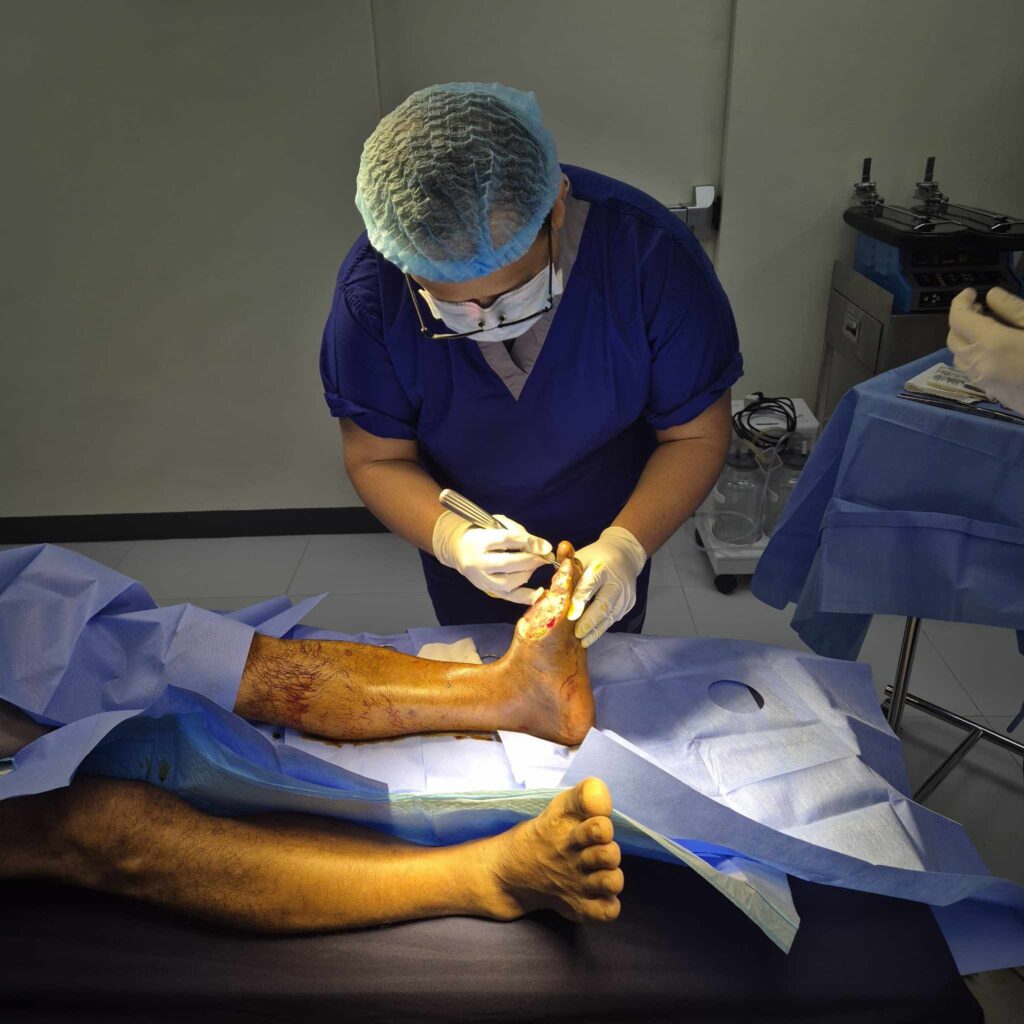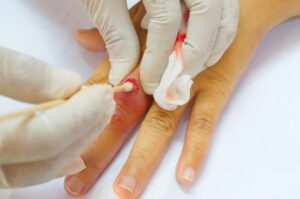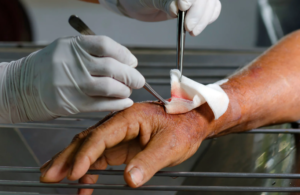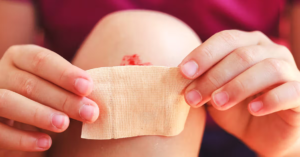Understanding Debridement and Its Role in Wound Care
Debridement is a medical process that focuses on removing dead, damaged, or infected tissue to allow a wound to heal properly. When tissue becomes necrotic or infected, it creates a barrier that slows recovery and increases the chances of complications such as severe infections or chronic wounds. This is why proper wound care goes beyond simple cleaning and bandaging—debridement is often required for the body to repair itself effectively. In many cases, wounds such as diabetic ulcers, surgical incisions, burns, or bedsores will not fully heal without this procedure. By carefully removing unhealthy tissue, healthcare professionals create a clean surface that encourages the growth of new, healthy skin and tissue. Debridement also reduces the chances of harmful bacteria spreading, which is especially important in patients with weakened immune systems or existing health conditions. For residents of Quezon City, having access to trusted medical providers who offer professional debridement services ensures that wounds are treated with the highest standards of safety and care.
Different Types of Debridement Methods
There are several approaches to debridement, and the choice of method depends on the type of wound, the patient’s health condition, and the severity of tissue damage. Surgical or sharp debridement is often used when immediate removal of dead tissue is necessary, especially for deep or infected wounds. This procedure is performed by trained medical professionals who use precise instruments to clean the wound quickly. Enzymatic debridement involves applying topical agents that break down necrotic tissue over time, making it a gentler option for certain patients. Autolytic debridement uses the body’s natural processes, supported by specialized dressings that keep the wound moist, which allows the body to slowly dissolve dead tissue. Mechanical debridement includes methods such as wound irrigation or wet-to-dry dressings that physically remove dead tissue. Each type has its own advantages, and healthcare providers in Quezon City carefully evaluate which method will bring the best results for each patient. Choosing the correct technique is key to ensuring safe healing, minimizing discomfort, and preventing complications.
Why Quality Debridement Services Are Essential in Quezon City
As a highly urbanized area, Quezon City has a growing demand for advanced medical care, including specialized wound treatment. Many residents live fast-paced lives, which means chronic wounds caused by diabetes, accidents, or surgery often go untreated or are managed incorrectly at home. Without proper care, wounds can easily become infected, leading to extended hospital stays or even life-threatening complications. Professional debridement services provide a level of treatment that simple cleaning methods cannot achieve. Clinics and hospitals in Quezon City that specialize in wound management are equipped with trained professionals and modern facilities to ensure effective treatment. This professional care not only addresses the wound itself but also reduces the physical and emotional burden for patients and their families. For individuals managing chronic conditions like diabetes, having access to quality debridement services nearby can mean the difference between prolonged suffering and a faster return to normal activities. Ensuring these services are accessible and reliable strengthens the overall healthcare system in the city.
What to Expect During a Debridement Procedure
Patients who undergo debridement often feel nervous about what the process involves, but knowing what to expect helps reduce anxiety. Typically, the wound is first examined carefully to determine the extent of dead tissue and the appropriate method for removal. Pain management is always a priority, and healthcare providers may apply local anesthesia or pain relief methods to keep the patient comfortable during the procedure. Depending on the severity, the treatment may be quick, such as with surgical debridement, or gradual, as with enzymatic or autolytic methods. After the unhealthy tissue is removed, the wound is carefully cleaned and dressed to protect it from infection and support healing. Patients are usually given clear instructions for post-procedure care, including how to change dressings, what signs of infection to watch for, and when to return for follow-up visits. In many cases, debridement may need to be repeated several times to ensure that all dead tissue is cleared. By knowing what to expect, patients in Quezon City can feel more at ease and confident when seeking this essential service.
Benefits of Seeking Debridement Services in Quezon City
There are many advantages to choosing professional debridement services instead of attempting home remedies or delaying care. One of the biggest benefits is faster healing, as removing dead tissue allows the wound to regenerate properly without obstruction. Patients also significantly lower their risk of serious infections, which can otherwise spread quickly and become dangerous. In Quezon City, access to skilled wound care specialists means patients receive treatment that is customized to their specific needs, whether the wound is caused by surgery, diabetes, or an accident. Clinics and hospitals often use advanced equipment and sterile environments, which provide a level of safety that cannot be achieved at home. Another key benefit is ongoing monitoring, as professionals track the progress of healing and adjust treatment when necessary. This comprehensive care helps patients avoid long-term complications and improves overall quality of life. Ultimately, seeking debridement services in Quezon City ensures that patients receive expert care that prioritizes both physical healing and comfort.
Choosing the Right Debridement Services in Quezon City
With many healthcare providers available, choosing the right facility for debridement can feel overwhelming. Patients should look for clinics or hospitals with licensed wound care specialists who have extensive experience in handling different types of wounds. Reviews and recommendations from other patients can also provide helpful insights into the quality of care offered. It is also important to select facilities that provide a multidisciplinary approach, where doctors, nurses, and wound care experts work together for the best outcomes. Asking key questions, such as the types of debridement available, the safety protocols followed, and the aftercare support provided, can help patients make informed choices. Insurance coverage is another factor to consider, as some health plans may fully or partially cover wound care services. Residents of Quezon City are fortunate to have a range of medical centers and clinics that specialize in advanced wound management, making it possible to find services that suit both medical needs and budget. Taking time to choose the right provider ensures effective and safe treatment.
Preventive Care and Long-Term Wound Management
While debridement is a critical part of healing existing wounds, preventive care plays an equally important role in long-term health. Patients, especially those with diabetes or circulation problems, must learn how to monitor their wounds regularly and seek medical attention when changes occur. Proper nutrition also plays a key role, as diets rich in vitamins, protein, and minerals support faster healing and stronger skin regeneration. Lifestyle changes such as maintaining proper hygiene, quitting smoking, and managing blood sugar levels can also reduce the risk of chronic wounds. In Quezon City, many clinics that provide debridement services also offer education programs to guide patients in caring for their wounds at home. This ongoing support helps patients avoid repeat complications and ensures better overall outcomes. Regular follow-up appointments also allow healthcare professionals to track progress and catch potential issues early. By combining professional debridement services with preventive care, patients can achieve lasting healing and improved well-being.
Frequently Asked Questions (FAQ)
1. Is debridement painful?
Pain levels vary depending on the type of debridement performed. Surgical methods may cause discomfort, but local anesthesia is usually provided to minimize pain. Other methods, such as enzymatic or autolytic debridement, are generally gentler and less painful.
2. How long does it take for a wound to heal after debridement?
Healing times depend on the size and severity of the wound, as well as the patient’s overall health. Some wounds may improve within weeks, while others may take months of repeated care.
3. Can I do debridement at home safely?
No, attempting debridement at home can be dangerous and may lead to infection or worsening of the wound. It should always be done by trained medical professionals.
4. How much do debridement services in Quezon City typically cost?
Costs vary depending on the type of debridement and the facility. Some procedures may be covered by health insurance, while others may require out-of-pocket payment.
5. Which type of wounds need immediate debridement services?
Chronic wounds, diabetic ulcers, severe burns, and post-surgical infections are common cases where immediate debridement is necessary.
6. Are there risks or complications associated with debridement?
Like any medical procedure, debridement carries some risks, including bleeding, infection, or delayed healing. However, these risks are minimized when performed by skilled professionals.
7. How often should debridement be repeated?
The frequency depends on the wound’s progress. Some patients require multiple sessions over several weeks, while others may need fewer treatments.






